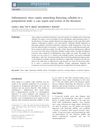 February 2023 in “Archives of Dermatological Research”
February 2023 in “Archives of Dermatological Research” Laser treatment, especially when combined with other therapies, is effective for hair regrowth in alopecia areata.
 6 citations,
November 2019 in “The application of clinical genetics”
6 citations,
November 2019 in “The application of clinical genetics” The study found that a specific genetic variation in the TNFα gene is significantly linked to Alopecia Areata in the Jordanian Arab population.
 3 citations,
August 2020 in “PubMed”
3 citations,
August 2020 in “PubMed” Some natural ingredients like onion juice, rosemary oil, and pumpkin seed oil may help with hair growth and reducing hair loss.
[object Object]  August 2024 in “Frontiers in Public Health”
August 2024 in “Frontiers in Public Health” Alopecia Areata severely impacts mental health, causing anxiety and depression, affecting quality of life.
November 2022 in “Frontiers in Medicine” PRP shows promise for treating mild alopecia areata but needs more research for cicatricial alopecias.
 43 citations,
August 2013 in “Pediatric Dermatology”
43 citations,
August 2013 in “Pediatric Dermatology” Trichoscopy is good for diagnosing and monitoring hair and scalp problems in children but needs more research for certain conditions.
 22 citations,
May 2012 in “Dermatologic Therapy”
22 citations,
May 2012 in “Dermatologic Therapy” Doctors should suggest hair replacement based on personal needs and stress scalp cleanliness to avoid skin problems.

A new minoxidil regimen improved hair loss in a lupus patient.
 November 2023 in “International Journal of Dermatology”
November 2023 in “International Journal of Dermatology” Trichoscopy helps tell apart other hair loss conditions from common hair loss.
 31 citations,
July 2017 in “Stem cell investigation”
31 citations,
July 2017 in “Stem cell investigation” Platelet-rich plasma (PRP) is a simple, cost-effective treatment that promotes hair growth and reduces hair loss, with high patient satisfaction.
 29 citations,
April 2013 in “Mycoses”
29 citations,
April 2013 in “Mycoses” A young man was initially misdiagnosed with a scalp condition but was found to have a fungal infection, which improved with antifungal treatment.
14 citations,
April 2017 in “Dermatology practical & conceptual” Yellow dots are common in severe alopecia areata.
 9 citations,
January 2017 in “Journal of the Egyptian Women's Dermatologic Society (Print)”
9 citations,
January 2017 in “Journal of the Egyptian Women's Dermatologic Society (Print)” Fungal infection was the main cause of hair loss in Egyptian children studied.
 4 citations,
October 2022 in “Genes”
4 citations,
October 2022 in “Genes” Our microbiome may affect the development of the hair loss condition Alopecia Areata, but more research is needed to understand this relationship.
[object Object] 4 citations,
March 2022 in “Journal of cosmetic dermatology” The mixed preparation helped hair regrowth but wasn't better than minoxidil.
3 citations,
January 2021 in “Journal of dermatology & cosmetology” Current alopecia treatments manage symptoms but don't cure, and better treatments are needed.
 2 citations,
December 2007 in “Expert Review of Dermatology”
2 citations,
December 2007 in “Expert Review of Dermatology” The document concludes that early diagnosis and treatment are key for pediatric hair loss disorders, and addressing the emotional effects on children is important.
 1 citations,
October 2014 in “Paediatrics and Child Health”
1 citations,
October 2014 in “Paediatrics and Child Health” The document concludes that proper diagnosis and management of hair loss in children require a detailed examination and understanding of various hair disorders.
August 2024 in “International Journal of Molecular Sciences” Mesenchymal Stem Cell therapy shows promise for treating hair loss in Alopecia Areata.
 January 2020 in “Archives of Medicine and Health Sciences”
January 2020 in “Archives of Medicine and Health Sciences” Certain immune molecules and stress affect hair loss, and while genes play a role, more research is needed to fully understand and treat it.
 35 citations,
January 1996 in “Dermatologic clinics”
35 citations,
January 1996 in “Dermatologic clinics” Tinea capitis is a common scalp infection causing hair loss, mostly in young children.
 34 citations,
December 2012 in “Indian Journal of Dermatology, Venereology and Leprology”
34 citations,
December 2012 in “Indian Journal of Dermatology, Venereology and Leprology” Mesotherapy shows promise for cellulite and facial rejuvenation but has mixed results for body sculpting and hair loss, with more research needed for safety and effectiveness.
 30 citations,
August 1983 in “Pediatric Clinics of North America”
30 citations,
August 1983 in “Pediatric Clinics of North America” Most hair loss in children is caused by a few common conditions, and it's important to diagnose these properly and support the child's mental health.
 17 citations,
January 2015 in “Current problems in dermatology”
17 citations,
January 2015 in “Current problems in dermatology” Understanding and treating hair disorders in different ethnic groups requires knowledge of specific hair care practices and hair characteristics.
 10 citations,
February 2011 in “Journal der Deutschen Dermatologischen Gesellschaft”
10 citations,
February 2011 in “Journal der Deutschen Dermatologischen Gesellschaft” The document concludes that proper diagnosis and evidence-based treatments are crucial for managing hair diseases, and psychological support for patients is important.
 9 citations,
December 2020 in “Dermatologic Therapy”
9 citations,
December 2020 in “Dermatologic Therapy” Certain drugs are effective for skin conditions like psoriasis, vitiligo, and hair loss.
8 citations,
January 2020 in “PeerJ” Alopecia Areata causes significant structural and compositional changes in hair.
 4 citations,
November 2021 in “Cancers”
4 citations,
November 2021 in “Cancers” The document concludes that understanding and managing hair loss in cancer patients is important, and more research is needed for better treatments.
 3 citations,
January 2012 in “Wageningen Academic Publishers eBooks”
3 citations,
January 2012 in “Wageningen Academic Publishers eBooks” Hair health depends on various factors and hair loss can significantly affect a person's well-being; understanding hair biology is key for creating effective hair care treatments.
 2 citations,
September 2021 in “Journal of Pharmacopuncture”
2 citations,
September 2021 in “Journal of Pharmacopuncture” Korean medicine may help with hair growth in alopecia, but more research is needed to confirm this.























